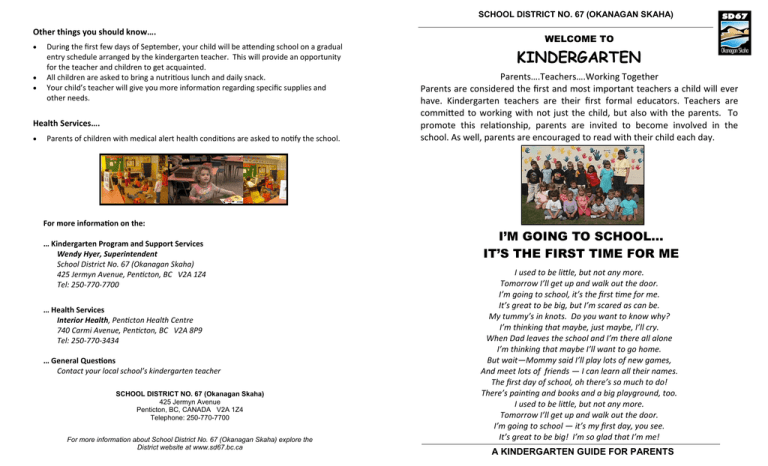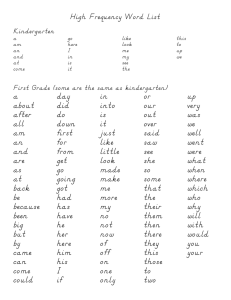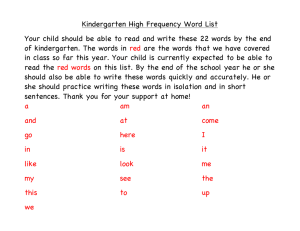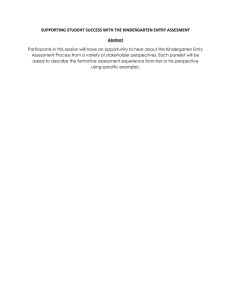KINDERGARTEN Other things you should know…. WELCOME TO
advertisement

SCHOOL DISTRICT NO. 67 (OKANAGAN SKAHA) Other things you should know…. During the first few days of September, your child will be attending school on a gradual entry schedule arranged by the kindergarten teacher. This will provide an opportunity for the teacher and children to get acquainted. All children are asked to bring a nutritious lunch and daily snack. Your child’s teacher will give you more information regarding specific supplies and other needs. Health Services…. Parents of children with medical alert health conditions are asked to notify the school. For more information on the: … Kindergarten Program and Support Services Wendy Hyer, Superintendent School District No. 67 (Okanagan Skaha) 425 Jermyn Avenue, Penticton, BC V2A 1Z4 Tel: 250-770-7700 … Health Services Interior Health, Penticton Health Centre 740 Carmi Avenue, Penticton, BC V2A 8P9 Tel: 250-770-3434 … General Questions Contact your local school’s kindergarten teacher SCHOOL DISTRICT NO. 67 (Okanagan Skaha) 425 Jermyn Avenue Penticton, BC, CANADA V2A 1Z4 Telephone: 250-770-7700 For more information about School District No. 67 (Okanagan Skaha) explore the District website at www.sd67.bc.ca WELCOME TO KINDERGARTEN Parents….Teachers….Working Together Parents are considered the first and most important teachers a child will ever have. Kindergarten teachers are their first formal educators. Teachers are committed to working with not just the child, but also with the parents. To promote this relationship, parents are invited to become involved in the school. As well, parents are encouraged to read with their child each day. I’M GOING TO SCHOOL… IT’S THE FIRST TIME FOR ME I used to be little, but not any more. Tomorrow I’ll get up and walk out the door. I’m going to school, it’s the first time for me. It’s great to be big, but I’m scared as can be. My tummy’s in knots. Do you want to know why? I’m thinking that maybe, just maybe, I’ll cry. When Dad leaves the school and I’m there all alone I’m thinking that maybe I’ll want to go home. But wait—Mommy said I’ll play lots of new games, And meet lots of friends — I can learn all their names. The first day of school, oh there’s so much to do! There’s painting and books and a big playground, too. I used to be little, but not any more. Tomorrow I’ll get up and walk out the door. I’m going to school — it’s my first day, you see. It’s great to be big! I’m so glad that I’m me! A KINDERGARTEN GUIDE FOR PARENTS Each child is unique…. Literacy - Emergent Reading Behaviour…. Each child learns and grows at his/her own rate, has different experiences, interests and each child has a different home life. But all children need... A good self image Love Approval Encouragement Guidance Acceptance Respect Laughter Conversation Time Patience Sympathy A sense of belonging Opportunity Tolerance Literacy - Emergent Writing Behaviour…. Play... Play is the fundamental activity of childhood. In Kindergarten, children play because this is the vehicle by which they learn. Active involvement allows children to gain understanding and acquire new concepts. Play is a child’s work. As the child plays, the child learns, explores, constructs, discusses, interacts, imitates, expands language, plans, solves, resolves disputes, creates, experiments, observes, generates ideas, evaluates and pretends. Emotional and Social Development... Emotional and social well-being are closely related, and are vital for everyone’s growth and development. Experiences will be provided that enable your child to develop a positive, realistic self concept; develop independence and responsibility; share, cooperate and learn from others; accept challenges; develop perseverance; develop friendships; cope with change; and enjoy living and learning. The Primary Program (K - Grade 3) provides children with experiences to help them learn to value and respect individual contributions. Your child will be encouraged to participate and contribute to group experiences, cope with change, appreciate and respect others, respect the • The experiences and knowledge that young children bring to school, combined with their natural curiosity and sense of wonder, are the foundation for learning in the primary years. The Kindergarten Program provides opportunities for children to express their knowledge and thinking in a variety of ways. Subjects such as Social Studies and Science are taught through literacy development. Through listening and speaking experiences your child’s knowledge of the spoken language is extended and enriched. Skills in communicating ideas and feelings are developed and the ability to listen for a variety of purposes is developed. Numeracy Development…. The math program currently in use is designed to help students make sense of mathematics. It will motivate and engage the children with real-world math in the context of familiar everyday environments and hands-on learning tools to build a strong numeracy skill base. Aesthetic and Artistic Development…. The arts are a natural and essential part of the child’s development. They provide pleasure and satisfaction, but they are also a way for children to respond to and interpret their real and imagined world. Art, Drama, Music and Literature experiences are provided to help your child develop enthusiasm for the arts. Physical Development and Well-Being…. Intellectual Development…. Develops when the child experiments with printing, becomes aware that print is “talk” written down, attempts to trace over or copy words or stories (with assistance) and works independently using invented spellings. Language Development…. Development of Social Responsibility... Develops when a child re-reads familiar books from memory, practices reading-like behaviour, tells stories about pictures, seeks meaning from symbols and print in the environment and moves from pretend reading to attempting to match the spoken word to the printed word. Physical well-being is an integral part of living and learning. The Kindergarten Program provides children with experiences to help them learn about their growth and development, and about their own role in maintaining a healthy lifestyle. Parents as Partners…. The best teaching method is encouragement. As children begin school, parents can continue to encourage their child to try a variety of experiences and to progress at his/her rate of learning. Chant nursery rhymes, sing songs, read to your child daily, play with your child and proudly display the results of your child’s creative efforts. Listen carefully to your child and foster your child’s natural curiosity about their world.



